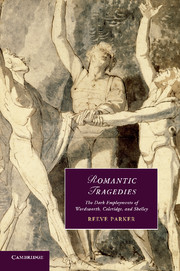Introduction: “Prowling out for dark employments”
Published online by Cambridge University Press: 05 May 2014
Summary
The sustained readings offered in Romantic Tragedies make the case for substantial – and hitherto largely unappreciated – aspects of poetic power and dramaturgic finesse in four verse tragedies written by Wordsworth, Coleridge, and Shelley. All were originally intended for performance in the licensed venues of Drury Lane or Covent Garden, though only one was actually staged. Each experiments boldly with the aesthetics of dramatic performance, drawing on – and challenging – inherited traditions. Each also undertakes to address and thereby influence momentous public issues in England's prolonged experience of social and political conflict during the French Revolution and its post-Napoleonic Regency aftermath. Bound up with those experiments and issues are significant traces of the playwrights' passionately driven and deeply fraught personal relations, fired by ambition, admiration, rivalry, and even revenge. And each play, I argue, depends crucially on an essential effect of tragic drama: uncertainty.
This brief Introduction serves in part to acknowledge the peculiar proportions of what follows. Part i consists of four chapters on the “Early Version” of The Borderers, the still seldom read and rarely performed tragedy that Wordsworth wrote before he became the celebrated lyric and narrative poet readers today know.
- Type
- Chapter
- Information
- Romantic TragediesThe Dark Employments of Wordsworth, Coleridge, and Shelley, pp. 1 - 10Publisher: Cambridge University PressPrint publication year: 2011

